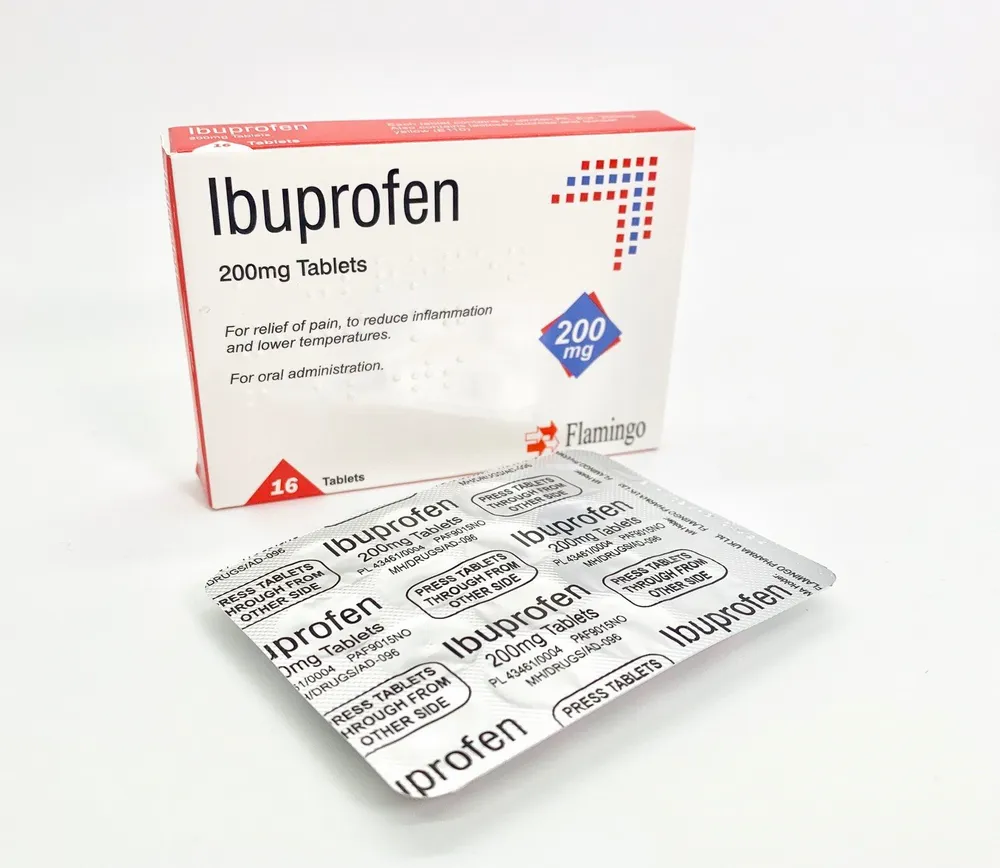Comprehensive Guide to Ibuprofen: Uses, Dosage, Side Effects, and More
What is Ibuprofen?
Overview of Ibuprofen
Generic Name: Ibuprofen
Brand Name: Advil, Motrin, Nurofen, generics
Drug Group: Nonsteroidal anti-inflammatory drug (NSAID)
Commonly Used For
- Relieve mild to moderate pain.
- Reduce inflammation in arthritis.
- Lower fever in adults and children.
Key Characteristics
Form: Oral tablets (200 mg, 400 mg, 600 mg, 800 mg), capsules, suspension (100 mg/5 mL), or topical gel (5%) (detailed in Dosage section).
Mechanism: Inhibits COX enzymes, reducing prostaglandin-mediated inflammation and pain.
Approval: FDA-approved (1974 for Motrin) and EMA-approved for pain and inflammation.

Indications and Uses of Ibuprofen
Ibuprofen is indicated for a wide range of inflammatory, painful, and febrile conditions, leveraging its anti-inflammatory and analgesic properties:
Mild to Moderate Pain: Alleviates headaches, dental pain, and menstrual cramps, per general practice guidelines, supported by clinical trials showing relief within 30 minutes.
Rheumatoid Arthritis: Manages joint inflammation and stiffness, improving mobility, recommended in rheumatology protocols with evidence of reduced joint swelling.
Osteoarthritis: Reduces pain and improves function in degenerative joint disease, with orthopedic data.
Fever Reduction: Lowers body temperature in febrile illnesses (e.g., colds, flu), effective in pediatric and adult populations, per infectious disease studies.
Dysmenorrhea: Treats primary dysmenorrhea, reducing uterine cramping, with gynecology evidence.
Migraine: Investigated off-label to alleviate acute migraine pain, with neurology research.
Patellofemoral Pain Syndrome: Managed off-label to reduce knee pain in athletes, with sports medicine data.
Post-Surgical Pain: Used off-label to control pain after minor procedures, with surgical studies.
Gout Attacks: Explored off-label to manage acute gouty arthritis, with rheumatology evidence.
Juvenile Idiopathic Arthritis: Initiated off-label in children to control joint inflammation, with pediatric rheumatology data.
Dosage of Ibuprofen
Dosage for Adults
Mild to Moderate Pain or Fever:
- Oral: 200–400 mg every 4–6 hours as needed, maximum 3200 mg/day.
Rheumatoid Arthritis or Osteoarthritis:
- Oral: 300–800 mg every 6–8 hours, maximum 3200 mg/day, with food to reduce GI risk.
Dysmenorrhea:
- Oral: 400 mg every 6 hours, starting at onset, maximum 3200 mg/day.
Dosage for Children (≥6 months)
Fever or Pain:
- Oral Suspension: 5–10 mg/kg every 6–8 hours, maximum 40 mg/kg/day, under pediatric supervision.
- Example: 10 kg child, 50–100 mg per dose.
Dosage for Pregnant Women
Pregnancy Category C/D (3rd trimester): Avoid in the third trimester due to fetal risks (e.g., premature closure of ductus arteriosus); consult an obstetrician, with fetal monitoring in earlier trimesters.
Dosage Adjustments
Renal Impairment: Reduce dose in severe cases (CrCl <30 mL/min); monitor renal function.
Hepatic Impairment:
Mild to moderate (Child-Pugh A or B): Use cautiously; severe (Child-Pugh C): Avoid.
Concomitant Medications: Adjust if combined with anticoagulants (e.g., warfarin) or other NSAIDs; monitor for bleeding.
Elderly: Start with 200 mg every 6–8 hours; monitor for GI and renal effects.
Chronic Use: Limit to the lowest effective dose and shortest duration to minimize risks.
Additional Considerations
- Take this active ingredient with food or milk to reduce gastric irritation.
- Avoid exceeding the maximum daily dose (3200 mg) to prevent toxicity.
- Use a calibrated device for liquid doses in children.
How to Use Ibuprofen
Administration:
Oral: Swallow tablets or capsules with a full glass of water; shake suspension well before use.
Topical: Apply gel to affected area (e.g., joints) and rub in gently, up to 4 times daily.
Avoid lying down for 10–15 minutes after oral use to prevent esophageal irritation.
Timing: Take every 4–6 hours as needed, not exceeding the daily limit.
Monitoring: Watch for stomach pain, black stools, or signs of allergic reactions (e.g., rash); report changes immediately.
Additional Tips:
Store at 20–25°C (68–77°F), protecting from moisture and light.
Keep out of reach of children due to overdose risk.
Use with antacids or proton pump inhibitors if prescribed for GI protection.
Schedule regular check-ups every 1–2 months for chronic users to monitor renal and hepatic function.
Educate patients on alternating with acetaminophen if needed, under medical guidance.
Contraindications for Ibuprofen
Hypersensitivity: Patients with a known allergy to Ibuprofen, aspirin, or other NSAIDs.
Active Peptic Ulcer Disease: Avoid due to increased bleeding risk.
Severe Renal Impairment: Contraindicated in CrCl <30 mL/min due to toxicity risk.
Severe Hepatic Impairment: Avoid in Child-Pugh Class C due to metabolism concerns.
Third Trimester Pregnancy: Contraindicated due to fetal risks (e.g., ductus arteriosus closure).
Coronary Artery Bypass Graft (CABG) Surgery: Avoid perioperatively due to cardiovascular risk.
Severe Heart Failure: Contraindicated due to fluid retention risk.
Warnings & Precautions for Ibuprofen
General Warnings
Gastrointestinal Bleeding: Risk of ulcers or perforation; monitor for abdominal pain or black stools.
Cardiovascular Risk: Increased risk of heart attack or stroke with long-term use; assess cardiac history.
Renal Toxicity: Risk of acute kidney injury; monitor creatinine in at-risk patients.
Hypertension: May worsen blood pressure control; check regularly.
Allergic Reactions: Risk of anaphylaxis in aspirin-sensitive patients; discontinue if severe.
Additional Warnings
Hepatic Injury: Rare elevation of liver enzymes; monitor hepatic function.
Asthma Exacerbation: Risk in patients with NSAID-induced asthma; use cautiously.
Fluid Retention: Risk of edema in heart or kidney disease; assess weight gain.
Skin Reactions: Rare severe reactions (e.g., Stevens-Johnson syndrome); stop if rash appears.
Hypersensitivity Reactions: Rare angioedema or bronchospasm; seek immediate care.
Use in Specific Populations
Pregnancy: Category C/D (3rd trimester); avoid unless benefits outweigh risks.
Breastfeeding: Use caution; monitor infant for effects.
Elderly: Higher GI and renal risk; start with low doses.
Children: Safe for short-term use with supervision.
Renal/Hepatic Impairment: Adjust or avoid in severe cases.
Additional Precautions
- Inform your doctor about heart disease, liver issues, or asthma before starting this medication.
- Avoid alcohol to reduce GI bleeding risk.
- Use the lowest effective dose for the shortest duration possible.
Overdose and Management of Ibuprofen
Overdose Symptoms
Nausea, vomiting, or abdominal pain.
Severe cases: Gastrointestinal bleeding, renal failure, or coma.
Drowsiness, tinnitus, or headache as early signs.
Respiratory depression or cardiovascular collapse with extremely high doses.
Immediate Actions
Contact the Medical Team: Seek immediate medical help.
Supportive Care: Administer activated charcoal if recent ingestion, provide IV fluids, and monitor vital signs.
Specific Treatment: No specific antidote; use N-acetylcysteine for rare hepatotoxicity or dialysis for severe cases.
Monitor: Check renal function, liver enzymes, and coagulation parameters for 24–48 hours.
Additional Notes
- Overdose risk is significant in children; store securely and use child-resistant packaging.
- Report persistent symptoms (e.g., severe stomach pain, difficulty breathing) promptly.
Side Effects of Ibuprofen
Common Side Effects
- Stomach Pain (10–15%, managed with food)
- Heartburn (5–10%, relieved with antacids)
- Dizziness (3–8%, decreases with rest)
- Nausea (3–7%, controlled with hydration)
- Rash (2–5%, managed with discontinuation)
These effects may subside with adaptation.
Serious Side Effects
Seek immediate medical attention for:
- Gastrointestinal: Ulcers, bleeding, or perforation.
- Cardiovascular: Heart attack or stroke.
- Renal: Acute kidney injury or nephrotic syndrome.
- Hepatic: Liver failure or jaundice.
- Allergic: Anaphylaxis or Stevens-Johnson syndrome.
Additional Notes
Regular monitoring with blood tests (e.g., creatinine, liver function) every 1–2 months is advised for chronic use.
Patients with a history of ulcers should use with a proton pump inhibitor.
Report any unusual symptoms (e.g., black stools, chest pain) immediately to a healthcare provider.
Long-term use (>3 months) requires cardiovascular risk assessment and blood pressure monitoring.
Drug Interactions with Ibuprofen
This active ingredient may interact with:
- Anticoagulants: Increases bleeding risk (e.g., warfarin); monitor INR.
- ACE Inhibitors: Reduces antihypertensive effect; monitor blood pressure.
- Lithium: Increases lithium levels; adjust dose.
- Methotrexate: Enhances toxicity; use cautiously.
- Diuretics: Decreases efficacy; monitor fluid status.
Action: Provide your healthcare provider with a complete list of medications.
Patient Education or Lifestyle
Medication Adherence: Take this NSAID as prescribed for pain or inflammation, following the dosing schedule.
Monitoring: Report stomach pain, bleeding, or signs of allergic reactions immediately.
Lifestyle: Avoid alcohol; engage in low-impact exercise to support joint health.
Diet: Take with food; avoid spicy or acidic foods if GI issues arise.
Emergency Awareness: Know signs of bleeding or heart issues; seek care if present.
Follow-Up: Schedule regular check-ups every 1–2 months to monitor renal and GI health.
Pharmacokinetics of Ibuprofen
Absorption: Oral, peak at 1–2 hours; bioavailability ~80–100%.
Distribution: Volume of distribution ~0.1–0.2 L/kg; 90–99% protein-bound.
Metabolism: Hepatic via CYP2C9 to inactive metabolites.
Excretion: Primarily renal (50–60% as metabolites); half-life 2–4 hours.
Half-Life: 2–4 hours, prolonged in renal impairment.
Pharmacodynamics of Ibuprofen
This drug exerts its effects by:
Inhibiting COX-1 and COX-2, reducing prostaglandin synthesis that mediates pain and inflammation.
Lowering fever by acting on the hypothalamus.
Exhibiting dose-dependent risks of GI bleeding and renal damage.
Storage of Ibuprofen
Temperature: Store at 20–25°C (68–77°F); protect from moisture and light.
Protection: Keep in original container, away from heat and humidity.
Safety: Store in a secure location out of reach of children due to overdose potential.
Disposal: Dispose of unused tablets or gel per local regulations or consult a pharmacist.
Frequently Asked Questions (FAQs)
Q: What does Ibuprofen treat?
A: This medication treats pain, inflammation, and fever.
Q: Can this active ingredient cause stomach pain?
A: Yes, stomach pain is common; take with food.
Q: Is Ibuprofen safe for children?
A: Yes, for short-term use with supervision.
Q: How is this drug taken?
A: Orally or topically, as directed.
Q: How long is Ibuprofen treatment?
A: Typically short-term (days to weeks), with monitoring.
Q: Can I use Ibuprofen if pregnant?
A: Yes, with caution; avoid in the third trimester.
Regulatory Information
This medication is approved by:
U.S. Food and Drug Administration (FDA): Approved in 1974 (Motrin) for pain and inflammation.
European Medicines Agency (EMA): Approved for pain, fever, and arthritis.
Other Agencies: Approved globally for NSAID therapy; consult local guidelines.
References
- U.S. Food and Drug Administration (FDA). (2023). Motrin (Ibuprofen) Prescribing Information.
- Official FDA documentation detailing the drug’s approved uses, dosage, and safety.
- European Medicines Agency (EMA). (2023). Ibuprofen Summary of Product Characteristics.
- EMA’s comprehensive information on the medication’s indications and precautions in Europe.
- National Institutes of Health (NIH). (2023). Ibuprofen: MedlinePlus Drug Information.
- NIH resource providing detailed information on the drug’s uses, side effects, and precautions.
- World Health Organization (WHO). (2023). WHO Model List of Essential Medicines: Ibuprofen.
- WHO’s inclusion of Ibuprofen for pain and inflammation.
- Journal of Rheumatology. (2022). Ibuprofen in Arthritis.
- Peer-reviewed article on Ibuprofen efficacy (note: access may require a subscription).
